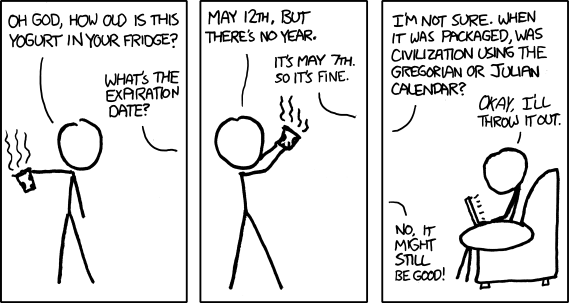737: Yogurt
| Yogurt |
 Title text: I am firmly of the opinion that if something doesn't have a year on it, every time the expiration date rolls around it is good again for the two weeks preceding that date. |
Explanation[edit]
Most packaged food has an expiration date that indicates when the food will probably no longer be suitable for consumption. This could be due to any number of reasons; most products will rot or grow mold after their expiration date passes, but some processed foods will "dry out" or just generally become "unpleasant" long before they spoil. The expiration date is sometimes called a "best before" or "use by" date for this reason.
Some products don't list the year as part of the expiration date, on the assumption that by the time the year becomes an issue, the food will be spoiled. Cueball and his guest are encountering this issue; clearly, the yogurt has gone bad - it's raising "stink lines" and appears to have visible mold - but the expiration date only lists "May 12th" and it's currently May 7th, so Cueball reasons that it must still be good since the expiration date hasn't passed yet. Somehow, he fails to notice the terrible smell coming off of it.
The Gregorian calendar was initially adopted in the Catholic European countries in 1582 to correct the slow drift of the seasons relative to the calendar year that occurred under the Julian calendar. The Protestant and Orthodox countries were slower to adopt it. The British Empire, including the American colonies, adopted the Gregorian calendar in 1752. Cueball (in a seemingly sarcastic manner) wonders whether the expiration date might have been printed under the Julian Calendar, i.e., at least just under a century prior (some nations in Eastern Europe changed from the Julian Calendar to the Gregorian Calendar only around the time of the First World War).
The Gregorian calendar (our current calendar) is mostly the same as the Julian calendar with two major differences:
- The Julian calendar overestimated the length of a year by 10 minutes 48 seconds or about 1 day every 128 years. The Gregorian calendar has 97 leap days every 400 years instead of 100, which reduces the error to about 1 day in 3300 years.
- As each country adopted the Gregorian calendar, it was necessary to skip the appropriate number of days to realign the Vernal Equinox with March 21. When the British Empire adopted the Gregorian calendar in 1752, 11 days had to be skipped, so in the English-speaking countries, September 2, 1752, under the Julian calendar was immediately followed by September 14, 1752, under the Gregorian calendar; there was no September 3–13 in that year.
The last line spoken by Cueball may mean one of two things: either 1) he is continuing to be sarcastic toward his friend, or 2) he is genuinely considering that it may not have gone bad, despite all the clues saying otherwise.
The title text is Randall's own (absurd)[citation needed] view: for a short period preceding the expiration date of any food, no matter how many years have passed, it suddenly becomes good to eat again. One might also wonder if the last two digits of the year were given in addition to just the day and month, and if Randall were given centuries to live, he might apply this principle centennially instead of annually.
Transcript[edit]
- [Cueball is holding a yogurt cup at arm's length. Waves of stink are rising from it.]
- Cueball: Oh God, how old is this yogurt in your fridge?
- [Someone speaks from off-panel.]
- Friend: What's the expiration date?
- [Cueball holds up the cup to look at the bottom.]
- Cueball: May 12th, but there's no year.
- [From off-panel again.]
- Friend: It's May 7th. So it's fine.
- [Now the second person is on panel, and Cueball speaks from off-panel. The second person is sitting down working on a laptop.]
- Cueball: I'm not sure. When it was packaged, was civilization using the Gregorian or Julian calendar?
- Friend: Okay, I'll throw it out.
- Cueball: No, it might still be good!
Discussion
It would seem that there is the potential for another layer of humour here. If you take the title text principle but adjust for Julian vs Gregorian calendars it may be the difference between whether the ancient yoghurt is 'safe' to eat. This requires suspension of disbelief regarding 250 year old yoghurt possibly being edible. Unfortunately when I do the maths it appears that had the date been set under the Julian calendar there would actually be effectively 11 extra days before the purported expiry date. Please tell me if I have this wrong, as it would be funnier that way. Plm-qaz snr (talk) 14:11, 9 August 2014 (UTC)
There are channels on YouTube where people eat/taste expired food such as MREs. I've seen a guy eat a hundred year old tin of bully beef. -- The Cat Lady (talk) 14:50, 19 August 2021 (UTC)
